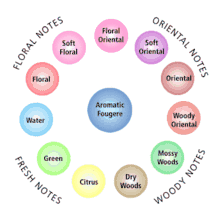Fragrance wheel
A fragrance wheel, also known as aroma wheel, fragrance circle, perfume wheel or smell wheel, is a circular diagram showing the inferred relationships among olfactory groups based upon similarities and differences in their odor. The groups bordering one another are implied to share common olfactory characteristics. Fragrance wheel is frequently used as a classification tool in oenology and perfumery.

The first example of a fragrance wheel was conceived by Austrian perfumer Paul Jellinek and titled the Odor Effects Diagram, published in the original German edition of his book The Practice of Modern Perfumery (1949).[1] Other notable versions include the Fragrance Circle, developed in 1979 by U. Harder at Haarman & Reimer, the Wine Aroma Wheel, from 1984 by sensory chemist Ann C. Noble, and the Fragrance Wheel, created in 1992 by perfumery taxonomist Michael Edwards.[2][3][4]
Fragrance Families and Personality
Various suggestions have been put forth about the relationship between a person's favorite scent family and their personality. Stephen V. Dowthwaite, founder of PerfumersWorld, claimed that "Our choices in perfume are influenced by [...] the image we want to portray." According to Dowthwaite, very feminine personalities gravitate toward Florals while very masculine personalities prefer the Woody family. Young people tend to like fruity, creamy, and vanilla scents, young adults prefer citrus and metallic scents, and mature adults enjoy heavy white flowers and Chypres. Elegant, sophisticated personalities enjoy aldehydes, powdery notes and leathers, while earthy, practical personalities prefer tobacco, spice and green notes.[5]
Michael Edwards' Fragrance Wheel
Developed by a perfume expert to help retailers and consumers, Edwards' wheel consists of a primary scent (Woody, Floral, etc.) divided into blended subcategories. Each of the subclasses were in turn divided into Fresh, Crisp, Classical, and Rich compositions. Prior to 2010 Fougère family was placed at the center of this wheel.[6]
In this classification scheme, Chanel No.5, which is traditionally classified as a "Floral Aldehyde" would be located under Soft Floral sub-group, and "Amber" scents would be placed within the Oriental group. As a class, Chypres are more difficult to place since they would be located under parts of the Oriental and Woody families. For instance, Guerlain Mitsouko, which is classically identified as a chypre will be placed under Mossy Woods, but Hermès Rouge, a chypre with more floral character, would be placed under Floral Oriental. Originally they are:
| Fougère | Floral | Floral |
|---|---|---|
| Soft Floral | ||
| Floral Oriental | ||
| Oriental | Soft Oriental | |
| Oriental | ||
| Woody Oriental | ||
| Woody | Mossy Woods | |
| Dry Woods | ||
| Fresh | Citrus | |
| Green | ||
| Water |
With the publication of Fragrances of the World 2008, two new sub-groups: Fruity and Woods, have been added to the wheel.[7]
| Fougère | Floral | Floral |
|---|---|---|
| Soft Floral | ||
| Floral Oriental | ||
| Oriental | Soft Oriental | |
| Oriental | ||
| Woody Oriental | ||
| Woody | Woods | |
| Mossy Woods | ||
| Dry Woods | ||
| Fresh | Citrus | |
| Fruity | ||
| Green | ||
| Water |
The chart was again modified in 2010, moving the Aromatics/Fougere group to between Citrus and Dry Woods to synchronize the chart with recent studies on smell perception.[8][9]
| Floral | Floral |
|---|---|
| Soft Floral | |
| Floral Oriental | |
| Oriental | Soft Oriental |
| Oriental | |
| Woody Oriental | |
| Woody | Woods |
| Mossy Woods | |
| Dry Woods | |
| Aromatic | |
| Fresh | Citrus |
| Fruity | |
| Green | |
| Water |
See also
References
- Jellinek, P. (1949) Praktikum des Modernen Parfümeurs, Vienna
- Harder, U. (1979). Der H&R duftkreis. Haarmann & Reimer, Contact, 23, 18-27.
- Noble, A.C., Arnold, R.A., Masuda, S.D., Pecore, J.O. Schmidt, and P.M. Stern, “Progress towards a standardized system of wine aroma terminology.” American Journal of Enology and Viticulture, 35 (1984), pp. 107-109
- Edwards, Michael. Fragrances of the World. Sydney, N.S.W.: Fragrances of the World, 1992. Print.
- "The Art and Technology of Perfumery Bangkok March 2012". PerfumersWorld (Video). DAY 4: 4-01--Perfume and Personality. Retrieved October 8, 2019.
- Edwards, Michael (2008), Fragrances of the world 2008, Michael Edwards & Co, ISBN 978-0-9756097-3-6
- Boberick, Mark David (2010-03-30), "Sniffapalooza Magazine Exclusive interview with Michael Edwards Fragrance Expert and Author of "Fragrances Of The World"", Sniffapalooza Magazine
- Zarzo, Manuel; Stanton, David T. (2009), "Understanding the underlying dimensions in perfumers' odor perception space as a basis for developing meaningful odor maps", Attention, Perception, & Psychophysics, 71 (2): 225–247
- Donna, Laura (December 2009), "Fragrance Perception: Is Everything Relative?", Perfumer and Flavourist, 34: 26–35
- Edwards, Michael (2011), Fragrances of the world 2011, Michael Edwards & Co